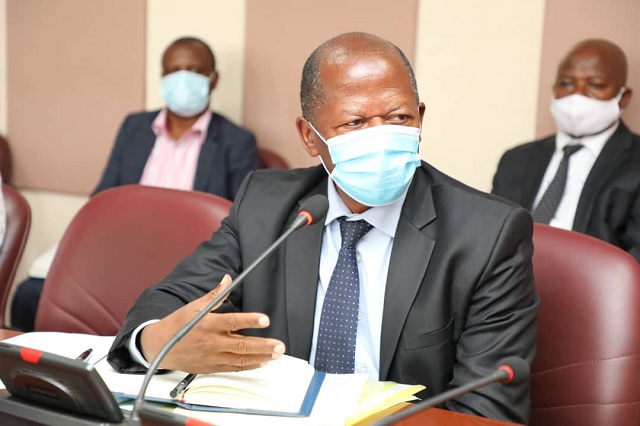
Kampala, Uganda | THE INDEPENDENT | The Minister of State for Higher Education, John Chrysestom Muyingo has revealed plans to have in place an apex body that will be charged with strategic planning for research activities in public universities and other institutions of higher education.
According to Muyingo, the apex body will have representatives from the different institutions and it has been included in the draft Higher Education and White Paper.
“The policy has been approved by the ministry’s top management and is pending presentation to cabinet,” says Muyingo.
The development is part of Muyingo’s written response to Parliament’s Public Accounts Committee- PAC Central Government regarding the cross-cutting audit issues in the education sector.
The response is the committee chaired by Busiro East MP, Medard Lubega Sseggona following the Auditor General’s value for money audit in the financial year 2020/2021.
The value for money audit was informed by challenges faced by public universities in the management of research grants. Auditor General John Muwanga assessed the management of research grants in four out of nine public universities and these included Makerere University, Mbarara University of Science and Technology, Kyambogo University and Busitema University.
Muwanga observed that there is no framework to ensure collective planning, coordination and follow-up of research efforts for the different public universities to ensure equitable allocation of resources, and efficient utilization of academic staff.
“Key research and grant management guidelines were missing at a number of universities to guide on the efficient and effective management of research activities. Furthermore, the country lacks national regulations and guidelines for research and innovation activities including; sourcing of external grants, development and uptake of technologies and, management and commercialization of intellectual properties,” reads part of Muwanga’s report.
The report revealed inadequate administration structures for management of university grants, noting that out of the four universities, only Mbarara University of Science and Technology had a grants office with dedicated staff to support grant activities.
Muwanga says that Busitema and Kyambogo universities did not have grants administrators at college or faculty level, while at Makerere and Mbarara, only the college of Health Sciences and the faculty of Medicine, respectively, had grant administrator to undertake the tasks.
The Auditor General further noted that the country does not have a clear research agenda to guide planning, implementation and policy matters regarding research and that Mbarara and Busitema universities did not have an approved research agenda.
Also highlighted by Muwaga’s audit report are the inadequate resource mobilization initiatives for public universities. According to the audit, only Makerere University had a consolidated Research Innovation Fund (RIF) for research funds from government.
“Other universities have not explored this initiative. All the universities have not raised any resources internally into a separate fund for research. This was attributed to government policy of remitting all internally generated revenue into the Consolidated Fund. Monitoring and Evaluation was inadequate in all the four universities. It was further noted that even where Monitoring and Evaluation was undertaken by donors, recommendations were not fully implemented,” Muwanga reports.
Further revealed by the audit is the significant delay in completion of research projects. For example, the Auditor General says that 450 (88 percent) out of 512 government funded grants from Makerere, Kyambogo and Busitema, were not completed in time during the period under review.
Similarly, 218 (62.3 percent) out of 350 donor funded grants from the 4 universities were not completed in time.
Muwanga recommended that the Ministry of Education and Sports should institute a committee with full representation from all public universities to collectively undertake strategic planning for activities in the universities. He also recommended that universities should then take the responsibility for mainstreaming the instituted framework into their management system and that regular audits of planned university research activities vis a vis expected outputs should be undertaken.
Muyingo concurs with the Auditor General saying that going forward, the Ministry will coordinate universities to prioritise development of key research and grant management policies to guide related processes and also benchmark with leading universities in the region and at the continental level.
In regard to a need for the National Council of Higher Education (NCHE) to introduce a standard legal framework for evaluation of management of research, Muyingo says that this is one of the areas to be addressed by the White Paper and Policy on Higher Education which is awaiting approval by Cabinet.
He adds that in the meantime, the NCHE has developed administrative guidelines which it uses to monitor and evaluate the research in universities.
Regarding the inadequate staff in universities, the Minister says that the Ministry of Education will continue to support the universities in seeking for additional wage from Ministry of Public Service, Ministry of Finance and Parliament to cater for staff establishments.
He added that his Ministry will advise universities to carryout job analysis with a view to re-designate staff or re-align them to handle additional responsibilities.
Parliament’s Public Accounts Committee is yet to conclude its investigations into the education sector audit and report back to parliament.
*****
URN
 The Independent Uganda: You get the Truth we Pay the Price
The Independent Uganda: You get the Truth we Pay the Price





